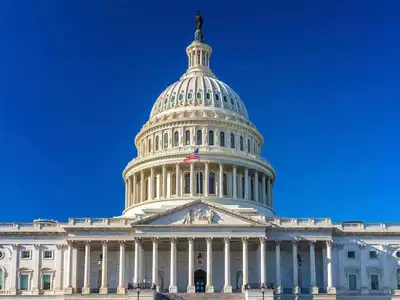WASHINGTON: A bipartisan group of lawmakers announced an agreement on legislation that would allow the US government to cut off billions in American investments in China.
The group made an announcement on Monday, Fox Business reported on June 14.
“Over the last couple of months, we have engaged in constructive discussions with stakeholders on developing a robust, targeted outbound investment mechanism to ensure the United States is not ceding its manufacturing power in industries critical to our economic and national security to foreign adversaries,” the senators said in a statement cited by the American media outlet.
“The refined proposal released today has bipartisan, bicameral support and addresses industry concerns,” they added.
The agreement is just one piece of a larger bill aimed at securing US supply lines for computer chips. If signed into law, the deal would allow the US government to review nearly half of all direct investment transactions from the US to China, according to an analysis.
The China policy comes as President Joe Biden considers ending US tariffs on China imposed under former President Donald Trump. The deep recession in China’s real estate companies is becoming a major problem for the country as well as for the world’s economy.
The property market was one of the few cherished destinations for household savings. The developers and homebuyers were also willing to take the loans from the banks but these good days for China ended last year. The household debt touched over USD 10 trillion. And around 27 per cent of bank loans in China are tied to real estate, reported a think tank, Policy Research Group (POREG).
The housing market in China is now seen as ‘a national threat’ as prices rise sky-high, just like the buildings, according to Think Tank citing New York Times.
Developers borrowed money in the form of onshore and offshore bonds, trust loans, and wealth management products, in addition to bank loans. Thus, lenders span from institutions to the general people both at home and overseas.
Interestingly, Beijing’s assault on property debt is part of the country’s battle to control corporate debt. Much of the corporate is held by the state-owned firms (SOEs). In SEOs, over-indebtedness is the root of the problem with one difference. For SOEs, the debt is laced with government guarantees, and hence there is no imminent threat of liquidation.
China has a debt to pay to the global market. It has benefitted from the globalization of the market; its companies though anchored behind the Bamboo curtain have spread to all corners of the world with their unadulterated motto that money has no colour. A crash in China could bleed into other countries and lead to deflation as also unemployment, according to Think Tank citing CNBC analysis.
Over China’s failing economy, US Federal Reserve also felt worried that it could harm the global economy. “Stresses in China’s real estate sector could strain the Chinese financial system, with possible spillovers to the United States,” the Federal Reserve said in its recent financial stability report. (ANI)






